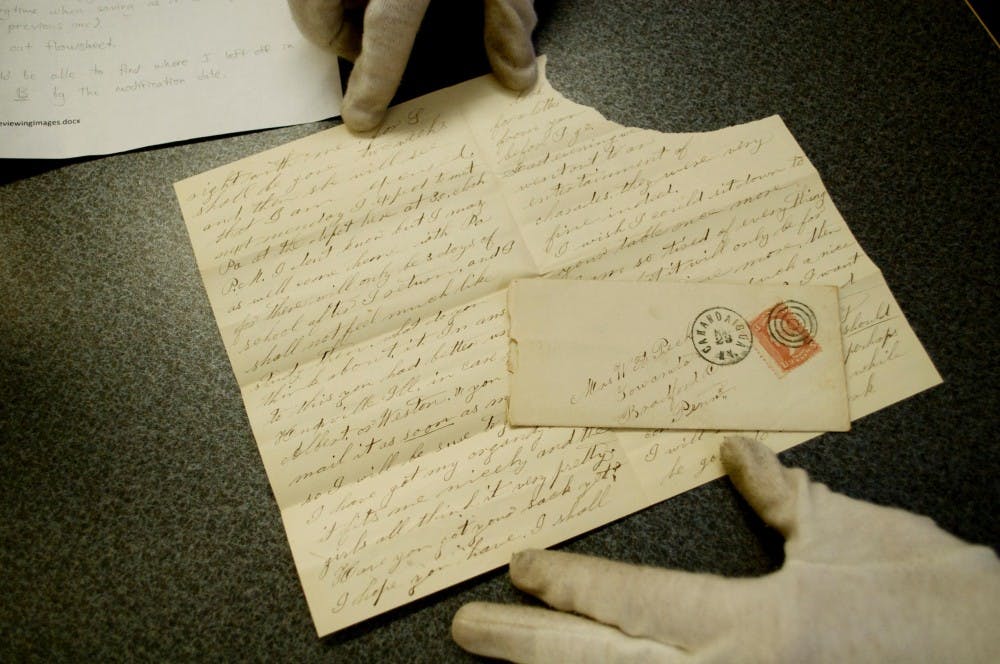History department, library, staff, students digitize 350 documents
(-- The Beacon)
By Will Lyons Staff Writer lyons14@up.edu
Imagine yourself as a surgeon in the Civil War with the Union Army. You've just completed surgery on a soldier and after a long day's work you sit back at camp and begin writing about your day to a lover back home.
History professor Mark Eifler is trying to mentally recreate this very scene as he reads and dates about 350 Civil War letters, which an anonymous donor has allowed the University to digitize exclusively for UP students and faculty to use.
The process of digitization, which involves scanning the letters and making them more readable with Photoshop and other programs, preserves the letters for future generations. After two months of working with the letters, Eifler and UP library staff have begun transcribing and analyzing the contents of the letters themselves.
"We need to understand who these people are before we learn what they're saying," Eifler said. "These people are dead, so there's no rush. We want to get it right."
Eifler returned the original letters to the donor last Friday, but he will always remember the artifacts that he wore white gloves to handle.
"The letters are like 150-year-old origami," Eifler said. "And the donor's first concern was to preserve them."
Tessa Daniels, a fifth-year senior and history and nursing double major is the first student to work on the project.
"You have to put aside your biases and say ‘If I was in the 1860's how would I perceive this letter?'" Daniels said. "This is a great find for military, medical and social history."
Daniels will be one of the first to get internship credit for working with the letters. According to Eifler, the history department and The Library will be working together to create more internships for students to continue transcribing and analyzing the letters.
Susan Hinken, head of technical services and collections at UP, looks forward to working with more students on the project.
"The students' work allows us to make the letters accessible for future readers," Hinken said. "Students have an important role in this project."
Hinken and Maggie Dull, digitization and preservation technical assistant, have scanned the images and are now editing them.
"We can manipulate the images to make them more readable," Hinken said. "With a computer program we can bring the letters back to life."
Having worked with pieces of UP's historical records, Hinken hopes to add the Civil War letters to the library's digital collections page which already includes many of the University's archives.
Eifler's current task is creating a genealogy and chronology for the people in the letters. So far he has discovered quite a bit.
According to Eifler, the letters begin in 1854 and catalogue events before and after the war all the way to 1870.
William Peck, the author, was a surgeon and high-ranking medical supplier who enlisted in the Union Army right at the onset of the war. Written to his wife back in Pennsylvania, the letters relate a reliable perspective of what was going on during the war. Peck disagrees with general George McClellan's tactics many times, gives gruesome details about the various surgical jobs he had to carry out and writes about the spread of disease and air born illnesses as well.
"This is at a time in American history when they don't quite understand germ theory," Eifler said. "But they are beginning to figure it out."
The relationship between letter author and letter receiver further adds to the historical importance of the letters. Peck tells everything to his wife Jane, otherwise known affectionately as Jenny or Bug.
"He doesn't have a hidden agenda in these letters," Daniels said. "Writing letters was his outlet to say ‘This is awful' or ‘This is great' and any time you read personal correspondence you really get to understand a person.'"
With the letters digitized and ready for continued transcribing, Eifler and Daniels hope to analyze the letters and write to historical journals about their findings, which may provide more insight into the war.
"How does the contents reflect what we know about the Civil War?" Daniels said. "Will they change any of the theories we hold about it?"








